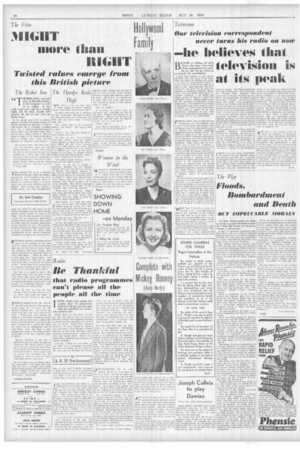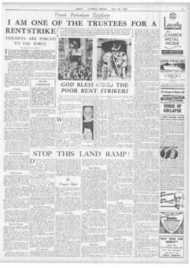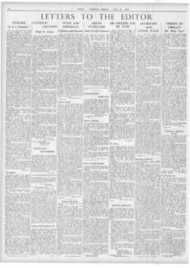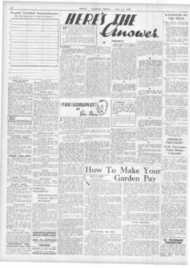Page 9, 28th July 1939
Page 9

Report an error
Noticed an error on this page?If you've noticed an error in this article please click here to report it.
Tags
Share
Related articles
Tv Needs Extra Vigilance To Guard The Family
The Monster Can Be Made To Serve
' Tory Party Brains Are Surrendering To Its Philistine...
Watch This Space On 'god-slots'
Shock, Horror A Family With No Tv
Television
Onr television correspondent never turns his ratIM on now
he believes that television is
at its peak BECAUSE of holidays—of which I have a due share—these notes will be suspended for four weeks. Let me take this last article as an occasion for recapitulation.
I hope that readers, as yet without television sets, read some of my notes. They are meant. to interest you to-day In a form of entertainment which is bound to be as universal as radio in a year or two. And universal television to-morrow will prove to be what the pioneers are making at present. Meanwhile, I do once again urge readers to consider installing a set before the winter months if they live within the accessible radius. Others should press for the extension of television to the larger cities. These matters are entirely In the hands of the U.B.C. and the trade, to neither of which is the convenience of the public a matter of the first importance. Cheapness of sets, wide service and high-class programmes must be fought for by the public itself.
FRUM the B.B.C. point of view the cost of television is a big difficulty, and I am in favour of an extra licence, even as high as a pound a year, and prepared to Mecums the carefully controlled admission of advertisement matter. No selling of time ao in the U.S.A. and abroad, but B.B.C. produced programmes of an instructive and interesting nature in which certain kinds of goods can be publicised. Some weeks ago we were shown how to pack for a holiday, a recent design in suit-cases and some late fashions being used for the occasion. I cannot see why the names of the makers and firths could not have been mentioned —for a consideration which would run into big figures, s, valuable would the publicity be. Selling time means practical control by the advertisers with the danger of commercialism. but taking what opportunities occur to help traders sufficiently ingenious to put Over original and useful ideas o; genuine interest could prove a public service as well as a valuable source of much-needed revenue.
However this be, may I say again that television is proving itself to he entertainment of a much higher quality than the general public yet realises, and it is already obtainable at a reasonably cheap rate. Since I possessed my set I have scarcely ever turned on the radio—any more than I should go to silent films, except for a very special reason. And since tribute should be given where it is due, I repeat that my Murphy only costs 1.30, (I am not paid a penny to say this, nor can I profit in any way by so doing.)
WHAT have I learned in these two months or so? I am beginning to believe that television at the present time may well be at its peak. Popularity and commercialism have not yet spoilt it, and I dread the danger of this form of entertainment and real education going the way of all flesh.
This came home to me the other night when I watched an historical reconstruction of The Parnell Commission. The production was simple, unpretentious and cheap and, as a result, the show was unique in quelity. The Piggott forgeries story was told through a series of scenes, the Phoenix Park murders, the personality of Parnell, the letters in The Times, the examination of Piggott and his suicide in Lisbon. As far as I am aware the history was scrupulously accurate, and history itself, by the mere process of being focussed into the limits imposed by time and space was allowed to give of its own tremendous dramatic value. I doubt whether the producers of to-morrow, with their greater wealth, increasing " box-office" sense and more vaulting ambitions, will not succeed in over-reaching themselves and apeing the cinema idea of history in a story of this kind. If so, we are seeing the best of television to-day.
There appears to be endless scope for dramatic historical reconstruction through the television. So long as we have the assurance that we are getting history, checked by real historians, and not the romance of the story-teller, we shall be re-introduced to a past of which the sense in this age is being rapidly lost, That is real work, and none the worse for being real entertainment.
I HOPE I am not being " high-brow " 1 It, pleading for less cabaret, musichall, crooners, acrobats, etc., I can give an assurance that no one loves them all better than I do when they appear on the music-hall stage, which I habitually frequent. My complaint here is that they don't come off. Acrobats and con jurors in particular are dismal beyond words on the small screen and deprived of the atmosphere in which they thrive. Claude Dampier is the first comedian at whose antics I have really laughed on this screen. I haven't tested Gillie Potter yet. To get over, the artist has to be funny or witty in himself—and it is a cruel test, as one can see by the results. Any day I should prefer a good talk, an interview, a demonstration of bee-keeping or gardening, any information, in fact, which I should enjoy getting from an interesting person sitting on the other side of my drawing room fire. The drawing room or parlour, remember, is the television atmosphere, and every time the producer forgets that he begins to fall.
AND while on this subject I wish to draw the attention of Alexandra Palace to a play, performed on Sunday night, called One aright, One Day. I had asked friends in to see it, and throughout the performance I felt uncomfortable. The plot centred round a man's temptation to make love to a girl who had dropped in for the night. It was funny and original, and I might not have minded it myself. I repeat that T felt uncomfortable as a host. That should not be. It is my first complaint of this kind. Again, it is a question of remembering that television begins and ends in the drawing room or parlour, not the theatre or the night club.
M, B.
blog comments powered by Disqus
















